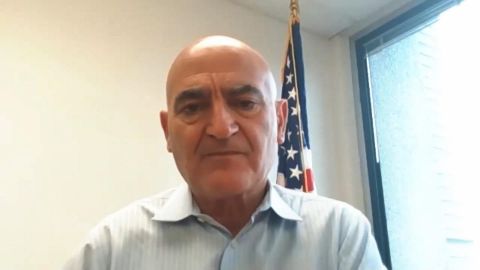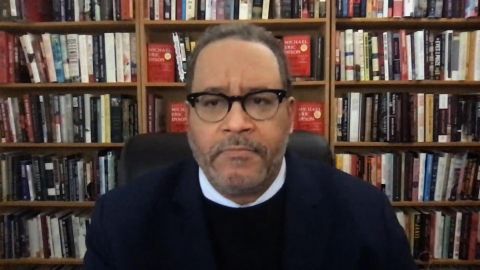Read Transcript EXPAND
CHRISTIANE AMANPOUR: You have dedicated the book that we’re going to be talking about to LeBron James.
MICHAEL ERIC DYSON, AUTHOR, “LONG TIME COMING: RECKONING WITH RACE IN AMERICA”: DYSON: Right.
AMANPOUR: So, I just wonder whether you think that some of these very popular and well-known and trusted members of the black community can help here?
DYSON: I think they can. I think that, yes, it helps to have President Obama take that vaccine or Presidents Clinton and Bush, perhaps if famous athletes did so as well. And I hope it’s with the recognition that black people have due — in due course, have had legitimate reasons to be skeptical, not enough to prevent them from taking the vaccine. But I think those who are in positions of power and authority scientifically or culturally or even politically should understand that legacy, that it is the legacy of white supremacy through a needle. It’s the legacy of white supremacy through a white coat. It’s the legacy of white supremacy through the manipulation of scientific rhetoric and discourse to justify the unintelligence of black people, the inferior capacity to learn of black people, parts of which persist in our own day, when we think about the work of Charles Murray and other people, who have tried to legitimate a bell curve suggesting that black people are inherently inferior when it comes to intelligence, must be expanded when we look at the range of sciences that are deployed to either enhance or somehow undercut black people. Having said all that, it does make a difference if some of these famous black people and folk get out there and other trusted figures to suggest, hey, we understand why you have skepticism and wariness, but this thing works. And guess what? The disproportionate impact on black and brown bodies suggests that we need to take this vaccine. And, furthermore, we ought to solve not simply the taking of a vaccine, but the lack of access of black and brown people to health care organizations that would prevent them from being so vulnerable to it in the first place.
AMANPOUR: And, indeed, what you describe is really grotesque. And I just wonder in general about your book “Long Time Coming.” You do dedicate it to LeBron James. Tell us why before we get further into it.
DYSON: Right. Well, I think LeBron James has been exemplary as the most remarkable athlete to put his reputation on the line, to leverage his platform in defense of ordinary black people. He has — not since perhaps Muhammad Ali has an athlete of his stature, of his global recognition, of his enormous popularity been willing to leverage all of that, in the face of that popularity, at the height of his global acclaim, in defense of what some would consider to be a controversial subject. That is that black lives should matter. That shouldn’t be controversial, but it remains so in many quarters. And so he’s been able to do that and to garner awareness in many pockets of the culture, some of which are sympathetic to black people, others of which may not have been necessarily inclined to do so. So, I wanted to celebrate a figure who, in the middle of the Black Lives Matter protests, led basketball players, along with Chris Paul and other figures, to stop their work when Jacob Blake was killed — was shot — I’m sorry — in Kenosha, Wisconsin. And they were saying, enough is enough, and we have got to make this point more poignantly.
AMANPOUR: So, it leads perfectly into the substance of your book, “Long Time Coming.” And you talk about the martyrs. You use that word martyrs, which is a very, very evocative word. And you write this book in the form of letters to individuals who have been killed in this terrible struggle.
DYSON: Right.
AMANPOUR: Tell me about martyrs and the overall message that you are trying to get across.
DYSON: Right. Well, victims, of course, of police brutality have died for some time who are black. But I think martyrdom is a deliberate choice. And I thank you for emphasizing that, because their lives, through no intent of their own, right? Most martyrs do intend, I will take up a particular issue, I will bear my cross, I will be willing to die and, therefore, be martyrs for a cause. These people have been forced to become martyrs. The consequence of their deaths have led to enormous changes of consciousness and galvanizing impetus among African-American people. It has also articulated a social imperative to change the structure of society. So, in that sense, Emmett Till didn’t choose to die at 14 years old, but his death has been used since its grotesque and grim occurrence, its grisly enactment in 1955, as a symbol of social resistance among African-American people and the determination to fight back against white supremacy.
About This Episode EXPAND
Moncef Slaoui, Chief Science Adviser for Operation Warp Speed, tells Walter Isaacson what he thinks vaccine rollout will look like in the U.S. Christiane speaks with author Michael Eric Dyson about America’s troubled history. Singer/songwriter Yusuf/Cat Stevens gives an impromptu special performance.
LEARN MORE


